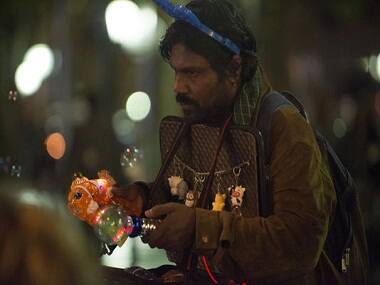Silence, sudden spurts of violence, an immigrant dealing with an imprisonment of sorts, the distance from home – in Dheepan, director Jacques Audiard delves into many of the motifs and themes from his previous films like A Prophet. In the film, Dheepan (Antonythasan Jesuthasan) whose life is ravaged by the civil war in Sri Lanka, travels with his family with a fake passport to Paris. But things seem a bit off – there is some sort of a void in the relationship with his wife and daughter. On the brink of poverty Dheepan sells glowy toys on the streets and eventually both husband and wife gets jobs as caretakers in a very rough Parisian underbelly. [caption id=“attachment_2490696” align=“alignleft” width=“380”]  A still from Dheepan. Image from Facebook.[/caption] This is where Dheepan is an important film: with the current immigration crisis in Europe it asks a lot of questions that urgently need to be answered. Is it really a positive movement for a country to let refugees in? What is the cost of a noble humanitarian effort in the grander scheme of things? How secure is the future of your country if the immigrants bring their own culture into it? How accepting are you of such a change, and how accepting are they if you ask them to change their ways? And even if the immigrants cause trouble, how different are they from the local homebred criminals really? And how does one solve all these problems with the economy directly related to the consequences of these problems? Audiard doesn’t really get into a deep philosophical discussion as much as a poetic one. The camera silently follows Dheepan as he winds his way through life, struggling to deal with his traumatic past, maintaining a violent secret and living a lie just to stay in safe. Even living in the ghettos of a first world country is better than staying in a palace of a third world infested with war. Or is it? A simple act of violence can trigger the traumatic memory of anyone who has been brought up in violence. Through Dheepan’s ravaged face Audiard captures the yearning for peace and family life, simple pleasures any human deserves but is hardly ever offered. As is the case with Audiard’s films the imagery is powerful. There is an exquisite scene earlier in the film where strange neon symbols glow in the dark like fireflies in silence, and Dheepan emerges from the darkness wearing glowing trinkets that he hawks on the street. Later a sex scene fades in an out like a brush strokes on canvas. The film’s atmosphere is elevated by French electronic boss Nicolas Jaar whose music incorporates Indian instruments to fantastic effect. Good luck keeping your eyes dry when Dheepan builds a little paper window which when opened shows a photo of his wife and kids. There’s a bit of comedic relief too – the quintessential nod of the head that Indians do to signal either a yes or a no is made fun of. The little bit of happiness that the characters experience feels earned, and it’s incredible that you connect with them so deeply even though they don’t say much. Jesuthasan hasn’t had much acting experience but thanks to Audiard’s direction you’ll never believe it. Much like Dheepan, Jesuthasan himself was an LTTE target who fled Sri Lanka and immigrated to Paris to start a new life. The fact that most of Dheepan’s life and journey was based on the very guy playing the character makes the film all the more mesmerizing. Kalieaswari Srinivasan, a theater actress from Chennai renders a more powerful performance as Dheepan’s wife Yalini who isn’t happy with their new home and wants to head over to London to stay with her cousin. The big secret between Dheepan and Yalini isn’t mined much for conflict but the little bit of drama that is caused by it is fascinating. In the final twenty minutes the film takes a more bombastic and populist turn, although it’s a requisite little twist for a genuine crowd pleaser. The film won the top award at Cannes, and audiences who can watch it at the Mumbai Film Festival should consider themselves lucky. Watch Dheepan during JioMAMI Mumbai Film Festival on Sunday Nov 1 at 3:45 pm, Monday Nov 2 at 7:00 pm and Wednesday Nov 4 at 1:50 pm. Check out the schedule here. Reliance Jio Infocomm Limited is a venture of Reliance Industries, which owns Network18 (of which Firstpost is a part).
Dheepan is an important film: with the current immigration crisis in Europe it asks a lot of questions that urgently need to be answered
Advertisement
End of Article
Written by Mihir Fadnavis
Mihir Fadnavis is a film critic and certified movie geek who has consumed more movies than meals. He blogs at http://mihirfadnavis.blogspot.in. see more


)
)
)
)
)
)
)
)
)



